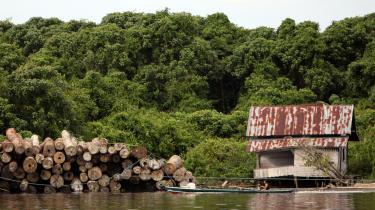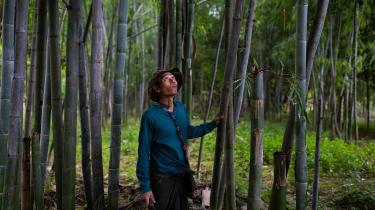The Forestry, Land Use and Governance (FLAG) programme in Indonesia has been a major component of UK Aid’s investment in tackling climate change by addressing market failures in forest governance in a country which counts as the world’s fifth largest emitter of greenhouse gases, mainly due to the conversion of its forests and carbon-rich peatlands. In a context of improving government ambition, private sector commitment and civil society space, FLAG took an explicit adaptive approach to fostering innovative interventions in a diverse, fluctuating context. As the lead of FLAG’s Evaluation Management Unit (EMU) with a strong local presence and understanding, our technical and capacity support for monitoring, evaluation and learning fed into programme decision-making and accountability over a five-year period.
Reducing deforestation and peatland degradation in Indonesia is an issue of global importance, not just in terms of reducing Indonesia’s contribution to global greenhouse gas (GHG) emissions, but also for the future livelihoods of forest-dependent communities, for biodiversity conservation, and for Indonesia’s long-term economic prosperity.
To help address these challenges, FLAG was a £32.5 million programme to reduce the rate of deforestation and peat land degradation in Indonesia, running from 2015-20. Led by the UK Climate Change Unit (UKCCU) in Indonesia, the programme aimed to significantly reduce Indonesia’s greenhouse gas emissions through six projects supporting innovative and adaptive approaches to address governance issues around forests, land use and natural resource conflict. Projects worked across 17 provinces, at different scales, to address a range of challenges that included supporting civil society to hold government agencies to account, increasing transparency and addressing rural land conflicts, supporting sustainable financing within the banking sector and mobilising public finances to tackle forest fires, peatland and forest management, and monitoring the actions of private sector interests involved in palm oil, mining and forest development.
FLAG was designed to foster innovative approaches for which there was as yet limited evidence for how and why they could work. The projects therefore needed to be flexible to respond to evidence and learning as it emerged over the course of implementation, as well as to changes in the delivery context and in the government’s priorities and policies. To support the UKCCU and its implementing partners with this, the EMU was tasked with the twin objectives of independently assessing the results achieved by FLAG, and generating evidence and learning to support programme decision-making. A Triple Line team, together with LTS International and Daemeter, a strong Indonesian presence, led the EMU from 2015 until the recent close of FLAG in September 2020.
The EMU provided the UKCCU, policy makers, implementing partners and the academic community with a robust evidence base for learning by FLAG and other programmes in Indonesia and elsewhere. Our work was framed by the FLAG theory of change, developed through a participatory and iterative process in inception and comprising five impact pathways, which provided the basis for the development of a comprehensive results framework.
Over the five-year duration of the programme, the EMU independently assessed the results achieved by FLAG to learn how the different approaches worked in different contexts and sectors. The learning generated supported decision making and adaptation, by both the UKCCU and its implementing partners. A key question for the EMU was to identify the positive and negative, intended and unintended impacts of FLAG on reducing environmental degradation and risks, improving governance and rule of law, strengthening communities, civil society and the private sector, empowering women and protecting human rights.
The EMU facilitated the introduction and application of new tools to measure performance against International Climate Finance KPIs on improved or protected livelihoods and avoided deforestation
This involved support to the projects to design, develop, implement and strengthen their monitoring systems and processes; ongoing quality assurance of project performance monitoring systems and processes; annual reviews of programme implementation progress and performance; and a final summative evaluation to assess the programme’s relevance, effectiveness, efficiency, sustainability, impact and learning; as well as communication products for external audiences. In addition, the EMU facilitated the introduction and application of new tools to monitor the performance of FLAG and other projects in terms of two of the key performance indicators used to measure performance of the International Climate Finance (ICF), the UK’s £5.8 billion climate finance commitment to emerging economy and developing countries.
Our evaluations and reviews have drawn on a wealth of evidence from a range of different studies and analytical approaches, including case studies, learning events, thematic studies and a series of learning briefs addressing key questions facing FLAG and similar interventions, including scaling, social forestry, fire prevention, public and private finance. At the close of the programme, our final evaluation found that it had:
- generated 12.1 million tonnes of avoided CO2e and avoided 20,958 hectares of deforestation and forest degradation;
- reduced emissions of greenhouse gases from an area of 33,000 hectares of peatlands in five provinces through fire prevention, fire suppression and rewetting;
- facilitated the formal licensing of 225,000 hectares of land under 106 social forestry permits including 44,682 hectares of ‘adat’ (customary) forest permits;
- supported the review and cancellation of 1,080 non-compliant (illegal) mining permits covering a total of 2,096,844 hectares of land (much of which was found to be in forested areas); and
- supported sustainability reporting from Indonesian banks covering a loan portfolio value of IDR1,137 trillion (£62.32 billion) as well as the issuance of environmental and gender bonds to the value of £538 million from leading Indonesian banks.
Credit: photos by Josh Estey / AusAID
Licensed under the Creative Commons Attribution 2.0 Generic license.




